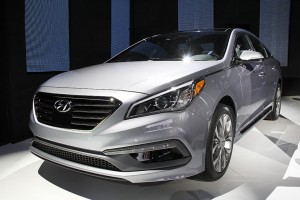
Power's Avoiders study warns that motorists still won't pay a stiff premium for alternative power models like the new 2016 Hyundai Sonata Hybrid.
With gas prices down below $2 a gallon in most of the country, there’s been a surge of demand for pickups and other big vehicles. Even so, fuel economy remains the key factor most motorists consider when buying a new car, truck of crossover, according to a new survey by J.D. Power and Associates.
But even the highest-mileage vehicles may not connect with buyers turned off by poor design or by the lack of the latest technological features, notes Power’s 2015 U.S. Avoiders Study. The annual report looks at both what motivates motorists to buy, reject or avoid particular models.
For the fourth year in a row, it turns out, fuel economy has remained the most influential factor in choosing a new vehicle. According to the 2015 study, 14% of shoppers listed mileage as number one on the list of why they bought a particular vehicle, while 16% said they rejected a vehicle because of its poor mileage.
“Consumers know that, although gas prices are low today, the cost of fuel will likely increase during the time they own their vehicle,” said Arianne Walker, senior director, automotive media & marketing at J.D. Power. “Clearly, consumers are considering the total cost of ownership when selecting their new vehicle.”
(Hyundai goes for hybrid two-fer with 2016 Sonata HEV and Plug-in models. Click Here for more.)
While mileage may be important, the study shows that shoppers are also likely to do the math when figuring out which vehicle to buy. And that means many motorists won’t buy a hybrid or some other high-mileage technology because of the price premium. About one in four shoppers – 24% — decided not to trade in a traditional, gas-powered vehicle for a hybrid because of the added cost.
The fact that so many shoppers, young and old, won’t pay a premium for hybrids and other high-mileage technologies could create some problems for the industry – and for federal regulators who have set a 54.5 mpg Corporate Average Fuel Economy standard for 2025, warned Power.
“Factors such as fuel prices and consumer demand may make these tough standards even harder to achieve, as you can’t mandate what people want to buy,” said Walker.
(Click Herefor a complete round-up of TDB’s coverage of the 2015 Detroit Auto Show.)
Surprisingly, the number of shoppers who rejected hybrids because of their cost was even higher, at 27%, among Gen-Y shoppers – that despite the generation’s reputation for being especially friendly to the environment. But it likely reflects the typical budget constraints faced by young buyers.
“Gen Y, the largest demographic group in U.S. history, comprises approximately 26% of the market, and their demand for larger vehicles will increase as their income increases and their households grow, putting further pressure on the ability for automakers to meet the strict federal mandates on gas mileage.”
Whether fuel economy will continue to hold sway over what American motorists buy remains to be seen. A series of recent, monthly studies by the University of Michigan Transportation Research Institute shows a trend downward in fuel economy as buyers opt for bigger, less efficient vehicles.
But automakers also are facing pressure to improve the mileage on even their largest and most powerful models. That was one reason Ford switched to lightweight aluminum for the body of its 2015 F-150 pickup, while Nissan plans to launch a high-mileage diesel version of its completely redesigned 2016 Titan truck.
(For more on the 2016 Nissan Titan XD diesel, Click Here.)
Even the most affordable, high-mileage models won’t score with consumers if they don’t meet other demands, however. According to the Power’s Avoider Study, 17% of buyers rejected a vehicle because of a poorly designed interior, and 14% said they avoided a certain product because it didn’t have the latest technological features. That was up from just 4% a year ago.
The 2015 Avoiders Study was based on responses from 30,000 new owners who registered their vehicles in April and May of 2014. That was before the latest, sharp downturn in fuel prices, so next year’s study is likely to be more revealing about the impact of sub-$2 gasoline.
